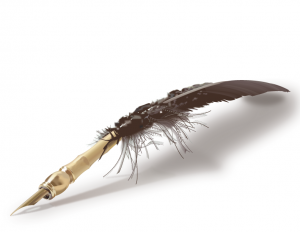I’ve loved words ever since I first learned to listen. Dr. Seuss’s silly stories enthralled me. Nursery rhymes, riddles, puns, tongue twisters…I savored them all. My parents and I used to make up funny names for people or things. A favorite velour jacket was my “scabaranzer.” When flowers died, they became “frivelly.” And when I got a knot in my yarn? It was a “boogle.” We imagined our new neighbors might be named Barney Bozoich or Rex Shekavondin. When my mom blew me a kiss at night, she said, “Zoot.” (Rhymes with put, not boot.) Zoot was the sound a kiss made, flying through the air. Apple breakfast bake was “applefumph.” Onomatopoeia. Now that’s a fun word to say. But why doesn’t its definition match its sound?
One cannot fall in love with words without falling in love with writing. I started writing “books” at age four. My first was an adventure composed in crayon: Blackie the Little Black Dog and the Flying Washing Machine. In junior high school my BFF and I wrote books, longhand, in our spiral binders. The plots were thin, involving crushes and unrequited, twelve-year-old love. But oh, how I loved to fill up those pages.
The books I cherished the most were those I read during that same time. Judy Blume’s Are You There, God, It’s Me, Margaret, Zilpha Keatley Snyder’s The Changeling and The Velvet Room. Harriet The Spy and Nancy Drew. These novels, devoured by a twelve-year-old only child who loved to read as much as she loved to write, shaped my future. These were the books that inspired me to write the Skylar Robbins series. I remember blissful Friday nights-–after watching the Brady Bunch and The Partridge Family—spent reading in bed. I couldn’t wait to crack open a new book, hold it in my hands, and read those exciting first words: Chapter One. My mom would make homemade molasses candy, each flat square individually wrapped in wax paper. A new Judy Blume book, a few pieces of molasses candy, a cat stretched out next to me, and maybe—a rainstorm? Now that was heaven!
I continued to write throughout high school, although by then my interest had turned more to music. I played guitar and sang, and began to write songs and poetry. By the time college rolled around my love affair with words was in full bloom, and I decided to major in Speech Communication. Linguistics, Journalism, Creative Writing…I can get a degree in this? Really? Sold! By then I was reading everyone from Ayn Rand to Stephen King, and after college I discovered Lee Child, John Grisham, and Robert Crais. I started to work on a rough draft of an adult novel, and analyzed the way they used foreshadowing and unexplained events to create suspense. When I wasn’t tapping out chapters on my computer, I was taking notes longhand on the techniques my favorite authors employed.
When I decided that I really wanted to write for the Middle Grade audience, I thought I’d better see what the current competition was like. Leaving the library giddy with an armload of Sarah Dessen and Deb Caletti novels made me feel like I was back in junior high, gleefully looking forward to a weekend full of glorious escape reading. I couldn’t wait to curl up with the first book, kick off my shoes, and dive in. No tablet or e-reader for me, just a fresh hardcover in my hands, smelling faintly of paper. Alternating between reading a greatly written MG or YA novel, getting a burst of inspiration for putting my own words down on paper, and blasting out a new chapter—that’s a rush I look forward to experiencing whenever I have free time. I might just have to whip up a batch of molasses candy. And I hope it’s going to rain.
Thank you to 3 Guys, 1 Book for the interview!

